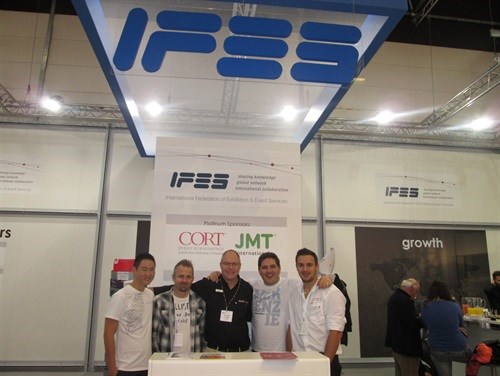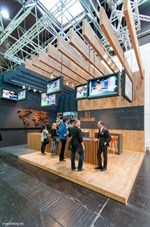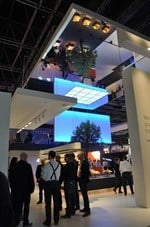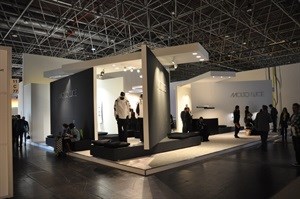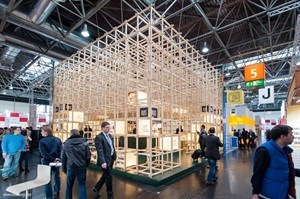
Scan Display reports on global retail and expo trends
The extensive use of fabrics on walls and ceilings of exhibition spaces - to hide the infrastructure of modular systems and to give the illusion of a custom-built space - is a major contemporary trend in exhibition spaces.
This is according to exhibition architect and Scan Display creative director, Paul Hugo. He was one of a nine-member executive management and creative Scan Display team that attended Euroshop in Düsseldorf, Germany during February.
Known as the world's number one trade fair for retail and exhibition spaces, the show attracted more than 109,000 trade visitors representing 110 nations. Since 1999, Scan has been sending employees to the show, which takes place every three years and covers a space equivalent to over 10 Cape Town International Convention Centres.
Scan exhibited on the International Federation of Exhibition and Event Services (IFES, of which Scan MD Justin Hawes is Treasurer) pavilion. This offered an excellent base from which to connect with IFES members and businesses considering exhibiting in South Africa.
Other current exhibition trends at Euroshop, said Hugo, include:
- Exhibition industry stands were on average about 20-40% smaller than at the previous show, although the retail industry still utilised huge areas with "massive" stands.
- The large system suppliers showed a lot less of the actual system infrastructure. Most focused on fabric applications.
- Colourways: Neutrals, black and white are popular, as well as wood (which is also frequently incorporated as a natural material).
- Messaging: Three-dimensional text is replacing large graphics. Message with text is far more prevalent than showcasing of large format graphics.
- Audio-visual (AV): Companies with specific AV offerings focus on its technical aspects, otherwise AV is superseded by person-to-person communications. The 'have a stand, want a plasma' days seem something of the past.
- Shape and form: Rectangular, angular exhibition spaces are prevalent, with fewer curved spaces and shapes.
- Movement: There is far more movement and interactivity in retail window displays. For example, a mannequin in a store front window changed faces (they were moved by a robotic arm); and in another example, a customer placed a hand on a window and a series of AV displays interacted with text messages in a personal way.
- Meeting places: Many of the most popular stands used their spaces socially. Visitors could sit down and relax, drink coffee and speak to the exhibitors. These proved far more effective than more formal layouts.
- Retail spaces: These displayed the most creative interpretations. Often an entire shop space was developed, appealing emotionally to the customer. The budgets for the retail stands are clearly larger than for the exhibition industry stands.
- Greening: Greater eco-awareness is promoting LED light applications (which use less energy) and the use of natural materials. The proliferation of LED light suppliers with technically specific applications is testament to this.
Discussing South African exhibition offerings in light of international trends, Hugo said: "Local companies are on a par with Europe as far as design is concerned, but are limited by available skills and materials as well as cost of materials. What we do produce on a limited budget, however, can outperform what overseas companies achieve within these constraints."
Scan also travelled to the manufacturing plants of some of its major international partners in order to reinforce existing business relationships and to ensure its technical knowledge remains current. Stops included ALMA in Italy, for which Scan is the exclusive carpet supplier in Southern Africa, to ensure a greater understanding of the manufacturing process and the trends in the European carpeting market.
The team also travelled to Berlin, to update themselves on the latest technical developments on the modulbox. This is a portable, pop-up, entirely self-contained event or info stand that is set up in less than an hour. Scan manufactures it locally under licence to mo-systeme in Germany.
"We wanted our team - representing the Johannesburg, Cape Town and Durban offices - to be directly exposed to international trends and contacts, for inspiration, to network, and to ensure we stay at the cutting edge," said Hugo.
"This exposure is being communicated throughout Scan and with our partners and clients. It translates directly into our company's product offering. As we have many international clients, we can understand their expectations better. This ensures we have the knowledge and ability to manage their needs to world-class standards."
Scan Display is a leader in the African exhibition, events and display industries, specialising in award-winning exhibition stands, exhibition and event infrastructure, mall activations and display products.
- Sustainable exhibits made easy26 Feb 12:23
- 6 shows, 1 re-usable exhibition stand19 Aug 10:45
- Justin Hawes recognised for his contribution to the global exhibition industry08 Jul 10:49
- The backlit fabric lightbox revolutionises displays20 Mar 11:42
- Scan Display wins South African exhibition industry awards12 Feb 13:54
Related
Sustainable exhibits made easy 26 Feb 2025 6 shows, 1 re-usable exhibition stand 19 Aug 2024 Justin Hawes recognised for his contribution to the global exhibition industry 8 Jul 2024 The backlit fabric lightbox revolutionises displays 20 Mar 2024 Scan Display and its MD win SAACI awards 25 Aug 2023













